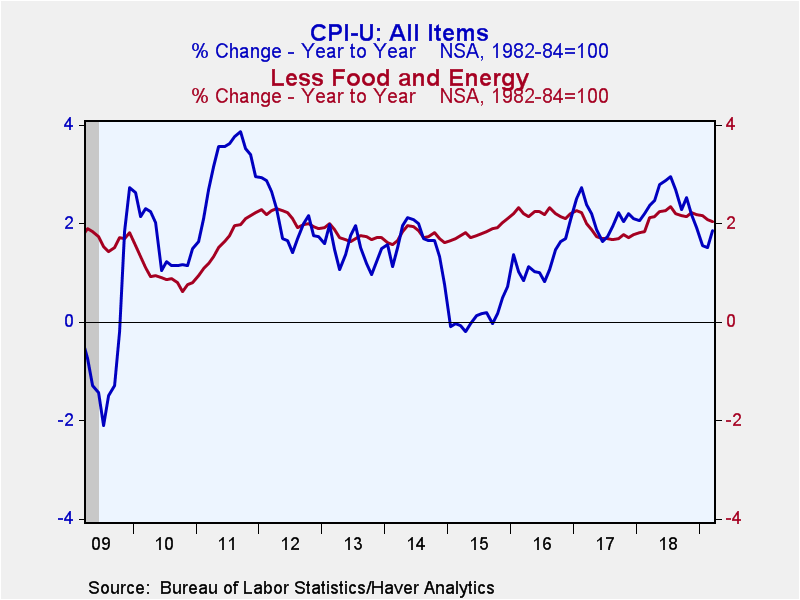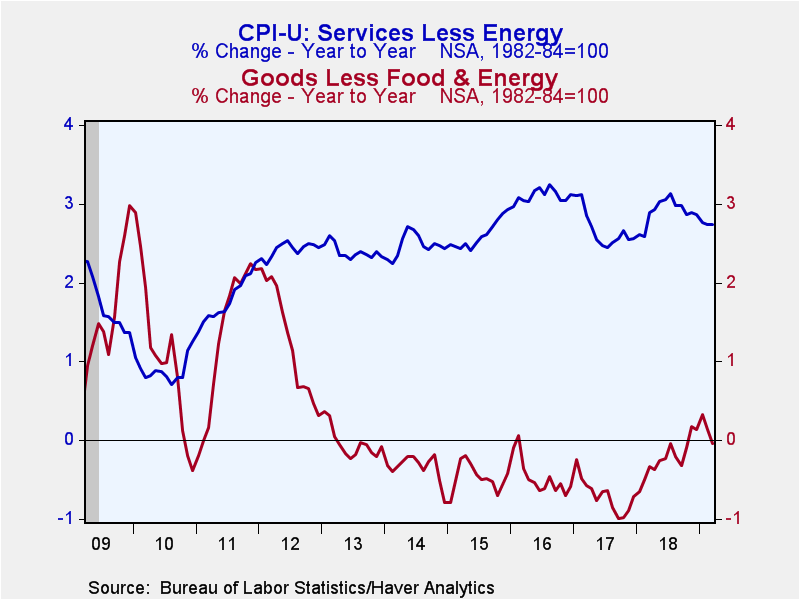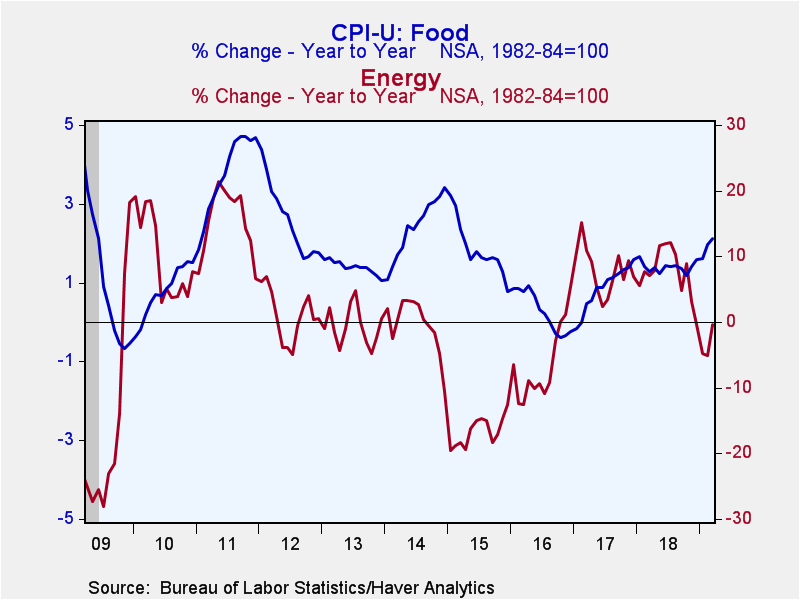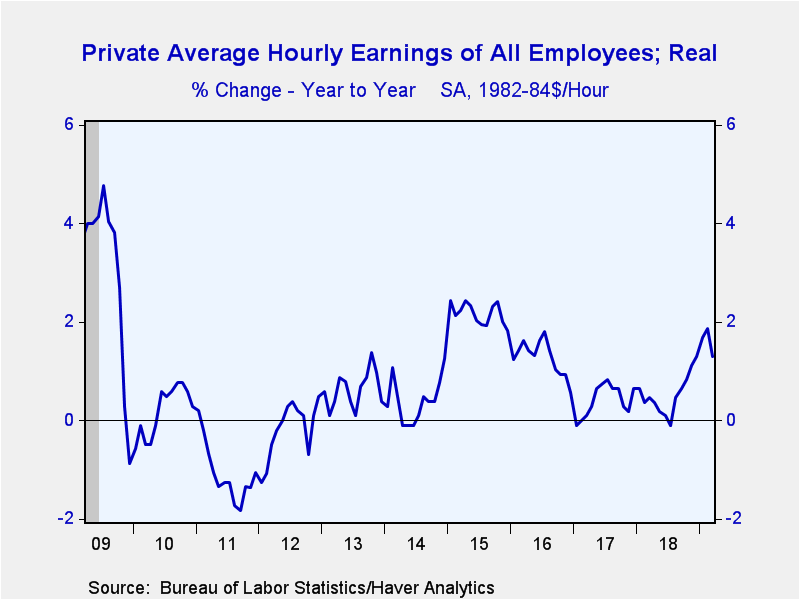 Global| Apr 10 2019
Global| Apr 10 2019CPI Strengthens With Higher Energy Costs; Core Prices Are Tame
by:Tom Moeller
|in:Economy in Brief
Summary
The Consumer Price Index increased an expected 0.4% during March following a 0.2% February rise. It was the largest monthly increase since January 2018. The 1.9% y/y increase compared to a 2.9% y/y high last July. The CPI excluding [...]
The Consumer Price Index increased an expected 0.4% during March following a 0.2% February rise. It was the largest monthly increase since January 2018. The 1.9% y/y increase compared to a 2.9% y/y high last July. The CPI excluding food & energy improved 0.1% for a second consecutive month. A 0.2% gain had been expected. The 2.0% y/y rise was the weakest since February 2018 and was below the 2.4% July peak. The expectations figures are from the Action Economics Forecast Survey.
Higher energy prices strengthened the gain in the overall CPI. Their 3.5% jump (-0.4% y/y) was the largest since September 2017 and followed declines during four of the last six months. The strength was led by a 6.5% surge (-0.7% y/y) in gasoline prices. Fuel oil costs also strengthened 2.1% (-0.4% y/y). Electricity prices improved 0.4% (0.3% y/y) but natural gas prices eased 0.1% (-1.4% y/y).
Food prices also were strong last month as they improved 0.3% (2.1% y/y) after a 0.4% rise. The gain was led by a 1.6% strengthening (3.9% y/y) in fruit & vegetable prices. Dairy prices also were strong and rose 0.6% (0.5% y/y). Egg prices improved 0.5% (-8.0% y/y). Meat, poultry & fish prices declined 0.3%, both m/m and y/y, as the cost of fish & seafood fell sharply.
Service prices improved 0.3% (2.7% y/y) following five consecutive months of 0.2% increase. Shelter costs rose an accelerated 0.4% (3.4% y/y) as the cost of lodging away from home jumped 0.8% (2.9% y/y). Rents of primary residences increased 0.4% (3.7% y/y) and the owners' equivalent rent of primary residences gained a steady 0.3% (3.3% y/y). Recreation services prices also improved 0.4% (2.6% y/y) and medical care service prices rose 0.3% (2.3% y/y). Education & communication service costs nudged 0.1% higher (1.3% y/y), but tuition costs strengthened 0.5% (3.4% y/y). These gains were accompanied by a 0.2% decline (-1.9% y/y) in the cost of public transportation.
Weighing on the gain in the overall CPI was a second consecutive 0.2% decline (-0.0% y/y) in core goods prices. Sporting goods prices strengthened 1.0% (0.3% y/y) and medical care goods prices rose 0.4% (-0.6% y/y). New vehicle prices also gained 0.4% (0.7% y/y). Furniture & bedding prices rose a modest 0.2% m/m but the y/y gain surged to 3.3%. Offsetting these increases were a 1.9% decline (-2.2% y/y) in apparel prices and a 0.7% weakening (+4.8% y/y) in the cost of appliances. Education & communication product prices eased 0.1% (-4.4% y/y). Recreation product prices held steady (-1.7% y/y) as video & audio product prices fell 1.7% (-4.9% y/y). Alcoholic beverage prices slipped 0.1 % (+1.5% y/y).
Also released today were figures on real earnings. The increase in the CPI caused real average hourly earnings to fall 0.3% last month (+1.3% y/y) after a 0.2% rise during February.
The consumer price data can be found in Haver's USECON database with additional detail in CPIDATA. The Action Economics survey figure is in the AS1REPNA database.
Does the Fed Know More about the Economy? from the Federal Reserve Bank of San Francisco is available here.
| Consumer Price Index, All Urban Consumers (% chg) | Mar | Feb | Jan | Mar Y/Y | 2018 | 2017 | 2016 |
|---|---|---|---|---|---|---|---|
| Total | 0.4 | 0.2 | -0.0 | 1.9 | 2.4 | 2.1 | 1.3 |
| Total less Food & Energy | 0.1 | 0.1 | 0.2 | 2.0 | 2.1 | 1.8 | 2.2 |
| Goods less Food & Energy | -0.2 | -0.2 | 0.4 | -0.0 | -0.2 | -0.7 | -0.5 |
| Services less Energy | 0.3 | 0.2 | 0.2 | 2.7 | 2.9 | 2.7 | 3.1 |
| Food | 0.3 | 0.4 | 0.2 | 2.1 | 1.4 | 0.9 | 0.3 |
| Energy | 3.5 | 0.4 | -3.1 | -0.4 | 7.5 | 7.9 | -6.6 |
Tom Moeller
AuthorMore in Author Profile »Prior to joining Haver Analytics in 2000, Mr. Moeller worked as the Economist at Chancellor Capital Management from 1985 to 1999. There, he developed comprehensive economic forecasts and interpreted economic data for equity and fixed income portfolio managers. Also at Chancellor, Mr. Moeller worked as an equity analyst and was responsible for researching and rating companies in the economically sensitive automobile and housing industries for investment in Chancellor’s equity portfolio. Prior to joining Chancellor, Mr. Moeller was an Economist at Citibank from 1979 to 1984. He also analyzed pricing behavior in the metals industry for the Council on Wage and Price Stability in Washington, D.C. In 1999, Mr. Moeller received the award for most accurate forecast from the Forecasters' Club of New York. From 1990 to 1992 he was President of the New York Association for Business Economists. Mr. Moeller earned an M.B.A. in Finance from Fordham University, where he graduated in 1987. He holds a Bachelor of Arts in Economics from George Washington University.
More Economy in Brief
 Global| Feb 05 2026
Global| Feb 05 2026Charts of the Week: Balanced Policy, Resilient Data and AI Narratives
by:Andrew Cates










